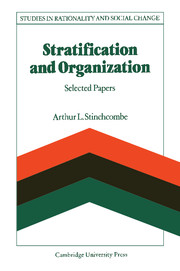Book contents
- Frontmatter
- Contents
- Acknowledgments
- 1 Rationality and social structure: an introduction
- PART I STRATIFICATION
- 2 Agricultural enterprise and rural class relations
- 3 Some empirical consequences of the Davis-Moore theory of stratification
- 4 Interdependence and inequality: a specification of the Davis-Moore theory (Co-authored with T. Robert Harris)
- 5 Marxist theories of power and empirical research
- 6 Social mobility in industrial labor markets
- 7 The sociology of ethnic loyalties
- 8 The deep structure of moral categories, eighteenthcentury French stratification and the Revolution
- PART II ORGANIZATIONS
- PART III SOCIOLOGY AS A PROFESSION
- Bibliography
- Name and place-name index
- Subject index
2 - Agricultural enterprise and rural class relations
from PART I - STRATIFICATION
Published online by Cambridge University Press: 06 July 2010
- Frontmatter
- Contents
- Acknowledgments
- 1 Rationality and social structure: an introduction
- PART I STRATIFICATION
- 2 Agricultural enterprise and rural class relations
- 3 Some empirical consequences of the Davis-Moore theory of stratification
- 4 Interdependence and inequality: a specification of the Davis-Moore theory (Co-authored with T. Robert Harris)
- 5 Marxist theories of power and empirical research
- 6 Social mobility in industrial labor markets
- 7 The sociology of ethnic loyalties
- 8 The deep structure of moral categories, eighteenthcentury French stratification and the Revolution
- PART II ORGANIZATIONS
- PART III SOCIOLOGY AS A PROFESSION
- Bibliography
- Name and place-name index
- Subject index
Summary
Marx's fundamental innovation in stratification theory was to base a theory of formation of classes and political development on a theory of the bourgeois enterprise (see Parsons 1949). Even though some of his conceptualization of the enterprise is faulty, and though some of his propositions about the development of capitalist enterprise were in error, the idea was sound: one of the main determinants of class relations in different parts of the American economy is, indeed, the economic and administrative character of the enterprise.
But Marx's primary focus was on class relations in cities. In order to extend his mode of analysis to rural settings, we need an analysis of rural enterprises. The purpose of this paper is to provide such an analysis and to suggest the typical patterns of rural class relations produced in societies where a type of rural enterprise predominates.
Property and enterprise in agriculture
Agriculture everywhere is much more organized around the institutions of property than around those of occupation. Unfortunately, our current theory and research on stratification is built to fit an urban environment, being conceptually organized around the idea of occupation. For instance, an important recent monograph on social mobility classifies all farmers together and regards them as an unstratified source of urban workers (see Lipset & Bendix, 1959).
- Type
- Chapter
- Information
- Stratification and OrganizationSelected Papers, pp. 33 - 51Publisher: Cambridge University PressPrint publication year: 1986



